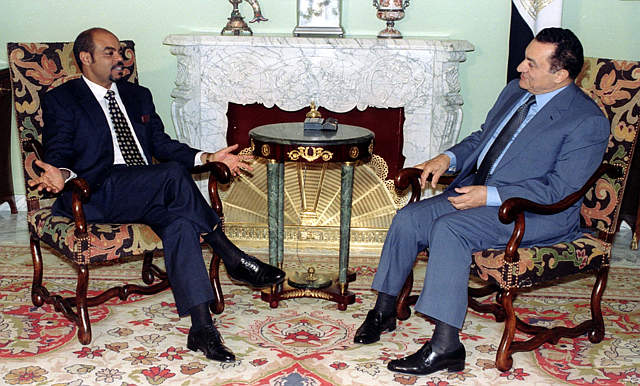 It is impossible to forecast how important the historic visit of Prime Minister Ahmed Nazif to Ethiopia last week will be. The historic 48-hour visit was widely acclaimed as a landmark in economic relations between Egypt and Ethiopia.
It is impossible to forecast how important the historic visit of Prime Minister Ahmed Nazif to Ethiopia last week will be. The historic 48-hour visit was widely acclaimed as a landmark in economic relations between Egypt and Ethiopia. What is certain is that there has been a remarkable shift in the whole tenor of Egyptian-Ethiopian relations. "We have moved from mutual distrust to friendly economic cooperation," Nazif's host, his Ethiopian counterpart Meles Zenawi, summed up the outcome of Nazif's trip to Ethiopia, the country that supplies more than 85 per cent of Egypt's water.
It is no secret that Egypt and Ethiopia have had a long-standing disagreement over the sharing of Nile water resources within the framework of the Nile Basin Initiative. Nazif's visit to Ethiopia resulted in the signing of a Memorandum of Understanding between the two countries last Wednesday, 30 December to establish the Egypt-Ethiopia Council of Commerce.
In practice, the blinding complexities of Egypt's relationship with Ethiopia are likely to kick off a series of the protracted and disputes of the past, long behind both neighbours now, and which proved to be prohibitively expensive and largely fruitless.
Egypt, for instance, is now officially sympathetic to Ethiopia's determination to construct three medium sized dams on the Blue Nile, the primary source of Egypt's water, to generate electricity for industrial purposes. Ethiopia, a country of 85 million people, mostly youngsters under the age of 20, has recently embarked on a course of rapid industrialisation. It desperately needs increased water consumption for its manufacturing, agricultural and domestic use projected to soar during this decade. Ethiopia, it appears, has finally managed to persuade Cairo that Ethiopia's plans are designed neither to start a trade war nor imperil the future of bilateral relations between Egypt and Ethiopia.
Ethiopia has no intention of circumventing the will of Egypt by building the new dams. Instead, Ethiopian officials explained that they wish to interest Egyptian investors into putting their money into such ventures. Egyptian officials readily resolved to accede to Ethiopia's wishes albeit conditionally. "We have agreed to the offer as long as it doesn't affect Egypt's Nile water quota," Minister of Irrigation Mohamed Allam told reporters in the Ethiopian capital Addis Ababa.
Most studies show some impact, though not a huge one, on the very energy-intensive nascent industries in Ethiopia. Barely three months ago, in October last year, Minister for International Cooperation Faiza Abul- Naga visited Ethiopia with Minister of Agriculture and Land Development Amin Abaza where they met Ethiopian Minister of Agriculture and Rural Development Tefera Debrebew. "We are confident that Egypt is willing and capable of supplying Ethiopia with much needed appropriate technology for sustainable development," Debrebew told reporters.
Ethiopia's Minister of Trade and Industry Girma Birru concurred, disclosing that Egypt was to participate in the construction of an industrial zone in Ethiopia.
Nazif was accompanied by a large delegation of Egyptian business leaders. Some 26 Egyptian agricultural companies are scheduled to inspect the land proposed by Debrebew. Nazif visited the gigantic Al-Sewedi Egyptian cable factory that inaugurated its Ethiopian branch two months ago in Dukem, 37 kms east of Addis Ababa, in Ethiopia's Oromia region.
The question of Israeli investments in Ethiopia inevitably cropped up. "Nazif did not visit Ethiopia to pontificate," Makram Mohamed Ahmed, head of Egypt's Press Syndicate, told Al-Ahram Weekly. "There is nothing that Israeli technicians and experts can provide Ethiopia with that we in Egypt cannot," he explained.
It is time for Israel to chuck in the towel in Ethiopia. Israel's record in Ethiopia and Africa at large is, after all, less than exemplary. Egyptian businessmen are not keen on ramming dubious economic fads down the throats of Ethiopian recipients. Egypt wishes to collaborate more closely on the economic and trade fronts with Ethiopia. And, Ethiopia has now declared that it is eager to cooperate more closely with Egypt.
The Ethiopian compromise, publicly acknowledging Egypt's right to its quota of Nile water, is an answer so obvious that one wonders why it was not on the table already. Now that it is, Ethiopia's pragmatism may produce better results.
Egypt, too, stands poised to prove that it can offer technical assistance to Ethiopia. Though no small challenge, it is one that can be met. Thrashing about trying to mend fences with Nile Basin nations and trying desperately to haul the Nile Basin Initiative out of its sinkhole will not resolve the development concerns of the upper riparian nations, including Ethiopia.
The upshot is that Ethiopia's economy is growing at an impressive five per cent annually, far higher than before. That was thanks predominantly due to better economic management, debt relief and increased capital flows from both Western nations and from China and other Asian economies.
It would be wrong to be wide-eyed about the new rapprochement between Egypt and Ethiopia. There are sceptics in Ethiopia and other Nile Basin nations who claim that increased Egyptian interest in upper riparian countries is simply a ruse to keep Egyptian entrepreneurs in gainful self-employment.
Much of the criticism of Egyptian investments in Ethiopia rings hollow. There was a touch of the absurd about the tug-of- war between Egypt and Ethiopia over the sharing of the Nile waters. Since then, Egypt's interest in Ethiopia has intensified.
Cairo's engagement with Ethiopia has caused much hand-wringing in certain quarters. However, Ethiopia is urging Egypt to adopt a scruples-free approach, and Egypt is apparently obliging. Egypt's scramble to invest in Ethiopia has got to be better than hesitating to engage.
Source: Al-Ahram Weekly

















No comments:
Post a Comment